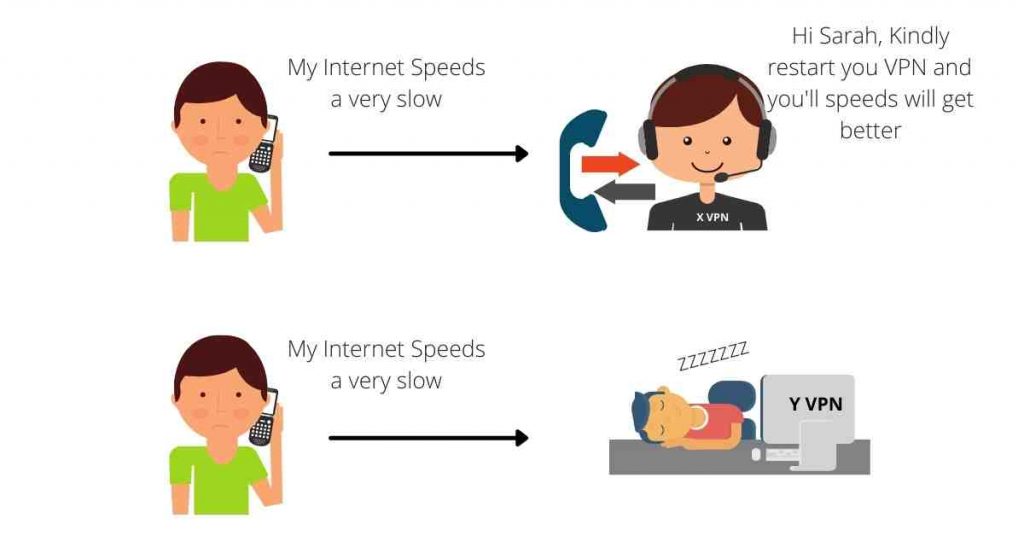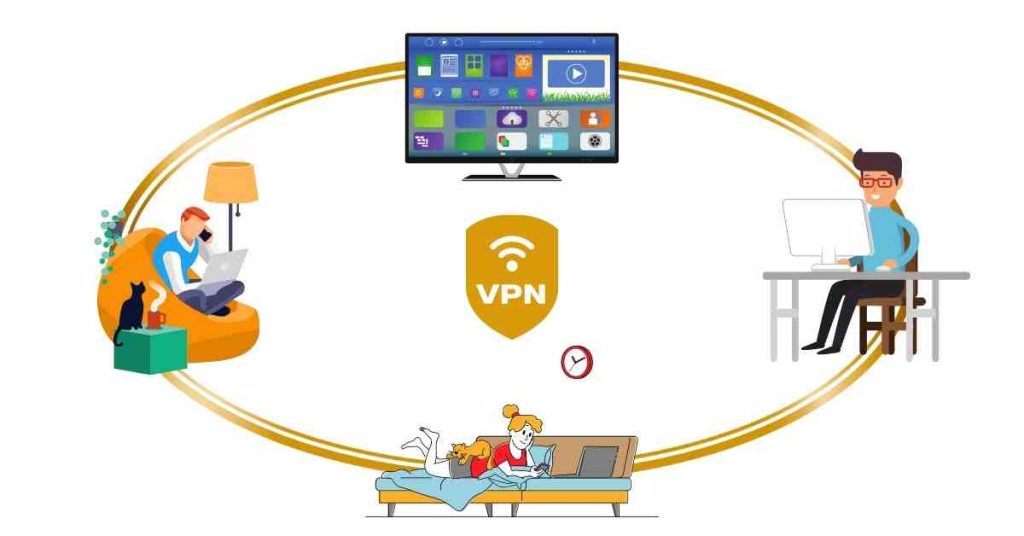Are you in search of the perfect VPN?
Lately, many people have become concerned about their online privacy.
Mainstream and digital media have exposed how corporations analyze personal data, extract insights to engineer targeted advertisements for internet users, and monetize it.
This development strikes many the wrong way.
According to a Cisco Consumer Privacy Survey, 84% of respondents indicated they care about their online privacy and 80 % said they are willing to protect it.
I’m almost certain you share these sentiments.
Virtual Private Network (VPN) is a technological solution that tries to solve this challenge. It works by distributing your internet browsing traffic across servers to hide your IP address and prevent its tracking.
As you expect, there are many VPN services online all eager to solve your privacy needs. Settling on one is a challenge that explains why you’re here today.
In this guide, we’ll look at how to choose the best VPN in 2021. I’ll give you 10 important things to look at before you settle on any particular VPN.
1. Security
The VPN industry has experienced tremendous growth over the past decade.
With growing concerns over personal data security, numerous VPN services have sprouted everywhere to meet the demands of internet users.
The VPN market has recorded tremendous growth and the Global Industry Analysts predicts that the Global VPN market will reach $77.1 Billion by 2026 from the current $32.2 Billion.
However, not all VPN services offer substantial security for your data and devices.

Advanced security is the backbone of a great VPN. What’s the essence of using a VPN service when it cannot protect you from bad hackers and malicious software?
Security risks associated with VPN such as hijacking, man-in-the-middle attacks, and split tunneling are real concerns for VPN users.
To eliminate such security risks, look for VPNs with robust encryption algorithms and support for strong authentication. These features are common in VPN brands that have been around for a while, constantly updating their software.
In addition, you want to consider a VPN with the ability to assign unique and private addresses to clients on a private network.
2. Privacy Level
This might sound cliché because the fundamental job of a VPN is to ensure privacy. But you’ll be surprised that not all VPNs offer the same level of privacy.
Almost all VPNs declare they keep no log. No log means they don’t collect any information transmitted through the network.
But it’s not always the case. Some do.
Bram Jansen of VPN studied over 120 VPN logging policies and found out that 14.4% of VPN services log traffic activity.
Remember, when you switch to a VPN, all the browsing data that your internet service provider previously had access to will be available to the VPN.

So you’ve got to do due diligence to ascertain whether or not your VPN of choice keeps track of this data.
Check out the privacy policy page and look for information on what type of data the VPN keeps. If you select cheap VPNs, you’re at a greater risk of having your data logged.
Small, obscure VPN companies offering deals that seem too good to be true are likely to have something fishy in their privacy policy.
Always go for established names with zero-logging policy.
3. Speed
A common challenge with using VPNs is that your connection speed will be slower than normal.
Data has a longer route with several remote servers to go through before reaching the final destination. In addition, the data will be encrypted for security purposes which puts a strain on your connection and results in slower speeds.
Considering that 50% of internet users use VPN to access entertainment content according to a survey TheBestVPN.com, speed matters a lot.
Slightly compromising internet speeds for better online privacy and security is worth it. But you shouldn’t have to contend with significantly slower speeds.

When shopping for a VPN, check for high download and upload speeds and low ping time (the time it takes for a data set to be transmitted from your device to the server and back).
In addition, the number of servers and users on a VPN affects internet speeds. The more the servers the better. But when too many people are using the same server, it’s likely to be overloaded.
It’s necessary to know how to choose the best VPN service for your needs especially if you’re a heavy internet user (you download large files and stream videos or games). In such a case, consider a VPN with many servers.
4. Server Locations
A VPN guarantees your privacy by distributing your browsing data across multiple servers located all over the globe.
This tactic is especially instrumental for citizens in countries where certain websites have been blocked by the government.
According to Freedom House, 61% of internet users live in countries where criticism of the government is subject to censorship.
Having servers in numerous locations offers more flexibility. By connecting to a VPN in locations where your target website is not censored, you can browse the web more freely.

Or maybe, you want to access a service that is unavailable in your country. Using a VPN with servers in countries where the service is available can help you circumvent the challenge.
However, be smart enough to adhere to government regulations and to avoid violating the user agreement of your content service respectively.
To comprehend how to choose the best VPN service for your needs, check the list of available server locations and choose one with servers covering most parts of the world.
Pick a VPN with servers in your country or in a neighboring country because the closer you are, the faster your connection will be giving you a smooth browsing experience.
5. Ease of Use
Wouldn’t it be nice if you could just purchase a VPN package, install the software, click “Turn on” and enjoy online private browsing?
For the average internet user, VPN looks like a technical term let alone something you want to try. And VPN services with complicated interfaces are not necessarily making it easier for people to adopt VPN.
This might have something to do with the current VPN use rate of close to 30% based on a study by Security.Org. That’s despite 72% saying they are aware of VPNs.
To save you the confusion of configuring a VPN well enough, you should select a VPN service that’s very straightforward.

Choose one that has been optimized and well configured. You don’t want to wrestle with settings unsure if you’ll mess up.
Its user interface should be simple and easy to navigate. It should have a combination of settings for basic users and for advanced users.
In addition, its out-of-the-box configurations should be enough to provide online privacy from the word go.
If you’ll be using the VPN service on several devices, it should have straightforward setup instructions. That’s part of knowing how to choose the best VPN service for your needs.
6. Tech Support
Besides features, figuring out how to choose the best VPN should involve human service considerations.
A good VPN company holds the hand of its customer. Hence, it dedicates time and resources to building an extensive and reliable support system that can guide customers through any product use challenges.
At the very least, it should have an exhaustive Frequently Asked Questions FAQ section; an accessible source of instructional information for customers with simple technicalities.
When buying a VPN service, take a trip on its website and skim through the FAQ section. A VPN service without one cares little about you.

Secondly, the company should have a dedicated team of expert customer care agents who are ready and eager to cater to your needs.
Besides great features, knowing that any questions you have when using a VPN, will be answered is equally important especially if you’re not tech-savvy.
Lastly, an extra tech support feature you should consider is the availability of chatbots that use artificial intelligence and machine learning to respond to human queries.
Due to 24/7 availability, Chatbot can help you solve queries instantly instead of having to wait for human support agents.
7. Compatibility
Another important factor you should consider is whether your VPN is compatible with a wide array of commonly used platforms and operating systems.
You’ll not understand how to choose the best VPN service for your needs without knowing where you’ll use them.
An exceptional VPN should offer simultaneous connections to multiple devices. You should be able to connect your laptop, smart TV, smartphone and still have room for other devices.
With a single VPN package, you can connect every device in the house and enjoy online privacy.
Equally important, your VPN of choice should be versatile with multiple software.

For instance, it should at least be compatible with the three most dominant operating systems; Windows, macOS, and Linux, and the top smartphone platforms; Android and iOS.
Don’t limit yourself to one platform.
In addition, it should work with your current antivirus. While the VPN hides your IP address for private browsing, the antivirus will caution you from opening potentially harmful data, destroy malware, and block hackers from accessing your device.
The versatility of a VPN portrays the effort the company invests in upholding your online privacy. Choosing the right VPN from the beginning secures your future.
8. Limitations
Some VPN companies have quotas on how much resource you can use.
They limit the total amount of data you can send and receive in a single connection session or over a period of time, often monthly.
Others limit the speed of data connection similar to ISP bandwidth throttling, which prevents you from streaming videos seamlessly.
Free and cheap VPNs almost always have these limitations. Premium VPNs on the other hand often claim to offer unlimited bandwidth. Don’t take it at face value.
From my experience, there’s always a limitation of how much resource you can use.

In today’s world where videos and music have taken center stage in our lives, bandwidth restriction is a big concern.
Hence, knowing the limitations when figuring out how to choose the best VPN service for your needs is essential.
Read the fine details of the packages offered and terms of service to see if there are any restrictions and choose wisely depending on how much content you consume regularly.
Ensure it doesn’t restrict any services or protocols you want to use. For instance, check if large file sharing and torrenting services are available before you settle on a VPN.
9. Ratings and Reviews
The internet gives you the opportunity to learn. With ratings and reviews, you can learn the experience of VPN customers and experts and make informed decisions in your quest to find out how to choose the best VPN service for your needs.
Software rating sites such as G2 World, Capterra, and PCMag are great places to find reviews.
You’ll come across expert reviews guiding you to select the best VPNs based on experience. You’ll also find comparisons between VPNs to help you choose between two equally enticing VPN offers.
However, most of these reviews are biased. For instance, bloggers tend to promote VPN products that can attract the highest affiliate income.

In essence, pay more attention to customer reviews. Most customers share their personal experiences with VPNs when it’s good and most importantly when it’s terrible.
These reviews help you separate brands with great services from mediocre brands.
The VPN services with few complaints have high-quality services. Those that consistently respond to customers’ complaints care about their customers.
Nonetheless, not all reviews are genuine. Some are paid reviews aimed to improve the image of a VPN service. With critical thinking, you should spot incentivized reviews and ignore them.
10. Price
Lastly, you cannot figure out how to choose the best VPN without considering prices. VPN prices range from free to hundreds of dollars per month depending on features, level of security, and resource allocation.
Free VPNs have one major advantage, you pay nothing.
But as the saying goes, nothing is free in this world. What you save in cost you pay in terms of compromised security, privacy and overall performance.
What should stop a VPN from logging your browsing history if you paid nothing?

Following closely are affordable VPNs. If you simply browse the internet or work online, these VPNs should be enough to handle your needs. But they can have a few limitations that could affect your browsing experience when you start streaming.
And then there are high premium VPNs. They offer unlimited bandwidths, fast speeds, and high standard privacy and security. You’ll pay more but enjoy a great browsing experience and ultimate privacy.
Depending on your level of concern for your privacy and internet usage habits, you should settle on an appropriate VPN.
To save, opt for annual or multi-annual packages which come with a good discount.
Conclusion
As you can see, knowing how to choose the best VPN is not as technical as it sounds. The basic considerations of any purchase apply.
By focusing on your unique needs and objectively comparing VPNs, you can find the best VPN. These ten things to look at when choosing a VPN should help you settle on a perfect tool for you.
Online privacy is a necessity in today’s society. It’s worth investing in a VPN tool that guarantees your privacy while not compromising your browsing experience.
Be open to testing several VPN services before you settle on one.
That’s how to choose the best VPN service for your needs.


